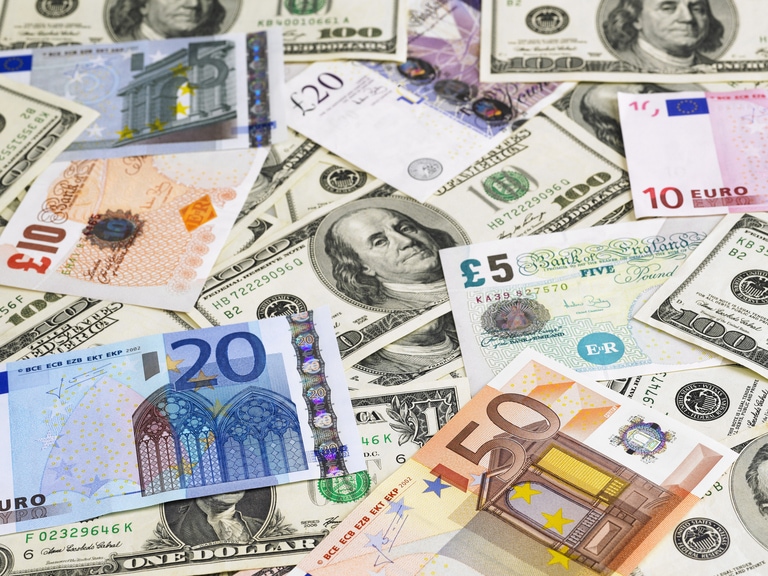European markets are once again on the back foot as concerns over the economic outlook continue to weigh on sentiment, with the biggest losers this week so far coming from the European banking sector, with Deutsche Bank, Commerzbank, and BNP Paribas losing ground over the last few days, along with Santander.
Europe
For today, the luxury sector appears to be seeing some profit-taking with Kering lower along with LVMH, Hermes, and Burberry weighing on the wider market, helping to push the CAC40 sharply lower.
The FTSE100 is also under pressure with the weakness very much broad-based across various sectors, with defensives feeling the pressure along with cyclicals, with health care a particular drag.
This looks to be down to disappointment over GSK’s guidance which has been perceived as a little cautious, keeping the full-year outlook unchanged, despite reporting Q1 numbers that came in ahead of forecasts. Q1 revenue came in at £6.95bn, which while lower than last year, was higher than expected. There was some outperformance across the various businesses. Vaccine sales came in at £2.04bn, while specialty medicines saw £2.24bn. The weakness in GSK appears to be spilling over into AstraZeneca which is also under pressure.
There’s been very little reaction to Asia focussed Standard Chartered Bank’s Q1 numbers which showed that the bank reported $1.71bn in profits before tax, a 23% increase on the same quarter last year. Net interest margin saw a decent increase to 1.63% from 1.29%, with the reopening in China helping to boost both revenues and profits.
Persimmonshares are the best performers despite fairly downbeat Q1 trading update which saw home completions fall 42% to 1,136 from a year ago. Net private sales per outlet fell 37% to 0.62, while forward sales were down 30% to £1.7bn...
It is clear that the rise in interest rates is starting to hit demand for housing, however, while the slowdown from 12 months ago appears stark, the trend from the end of last year when the net sales rate was 0.30 per outlet, does point to a pick up and it is this that appears to be driving the shares to 6-week highs. Barratt Developments and Taylor Wimpey shares are also higher.
Reckitt Benckiser shares have slipped back from 7-month highs, despite a solid Q1 trading statement which has seen total net revenues rise 14.4% to £3.9bn. Health and nutrition were strong performers seeing growth of 12.5% and 11.9% respectively. On a like-for-like basis, this equates to a 7.9% increase with all business units contributing as the company raised its revenue outlook for the year to between 3% and 5%.
We’ve seen further weakness in Associated British Foods’ share price after yesterday’s H1 numbers and the management warning about possible challenges to consumer spending particularly in respect to the Primark business in the weeks and months ahead. JD Sports Fashion shares are also under pressure.
US
US markets opened higher helped by the positive lift from yesterday’s earnings numbers from Microsoft and Google owner Alphabet, however, the gains appear to be losing steam as we head into the European close, with the Nasdaq 100 outperforming as the Dow and S&P500 slip back.
Microsoft shares have opened higher after yesterday’s Q3 numbers surprised to the upside. Revenues came in at $52.9bn, above estimates of $51bn, with commercial cloud revenue coming in at $28.5bn. Profits also came in ahead of expectations at $18.3bn or $2.45c a share.
All business areas beat expectations, intelligent cloud revenue came in at $22.1bn, a rise of 16%, and subscription products revenues rose 11% to $17.5bn. Personal computing revenue was the only area of decline, falling 9% to $13.3bn, it still comfortably came in above consensus, although Windows OEM and devices revenue saw a sharp decrease of 28% and 30% respectively. What this tells us is that consumers and businesses are continuing to feel the squeeze in terms of new hardware, but that the online business appears to be slowdown-proof for now.
The UK’s Competition and Markets Authority decision to block the takeover of Activision has seen the shares of the latter plunge in opening trade, with the gaming company pledging to appeal the decision in quite strong terms, angrily claiming that “the UK is clearly closed for business”. Truth be told that was true when the government went through with the recent corporation tax increase, although the CMA does have form for inexplicable decisions. It is quite possible the decision by the CMA has some merit, however, the CMA’s track record doesn’t inspire confidence. The decision to force JD Sports to spin off Footasylum, and the blocking of the Asda/Sainsbury merger are recent examples of controversial decisions.
What’s even more damaging from a UK point of view is the Activision claim that the country is “clearly closed for business”, which given recent evidence is getting harder to push back against.
It’s the latest in a long line of decisions that has irked businesses in the last 12 months. The government pressing ahead with the imposition of indiscriminate windfall taxes, as well as the decision to push ahead with the increase in corporation tax to 25% in the face of widespread opposition. The government can claim for all its worth that it is business-friendly, as the Prime Minister did yesterday, however, the evidence of the last 12 months would suggest the opposite is true.
Alphabet’s share price reaction has been more subdued, with disappointment over lower profits, being partially offset by a big jump in demand for its cloud services which saw an increase in revenue to $7.45bn. This helped offset modest declines in advertising and YouTube revenues. YouTube revenue fell 2.6% to $6.69bn, while advertising came in at $54.55bn. The company also announced a $70bn share buyback, while also announcing it was taking a $2.6bn charge in respect of severance costs for the 12,000 job losses reported earlier this year, along with residual amounts in relation to reduced office space. Attention will now shift towards today's numbers from Facebook owner Meta Platforms after their more than 70% share price rebound so far year to date.
Solar stocks appear to be losing their shine after Enphase Energy reported that Q1 revenue rose by 64% to $726m, slightly below forecasts, with revenues in the US the weak spot. They also posted Q2 guidance that was a little on the low side of between $700m and $750m, below estimates of $773m. This has translated into broader weakness across the solar sector, with SunPower, Sunnova and Sunrun all under pressure.
In further signs of turbulence in the US banking sector, First Republic shares have remained under pressure as doubts over its survival continue to circulate, while its sector peer PacWest has seen its shares jump after reporting that deposits had stabilised, and risen to $28.2bn, and were now higher than they were when the bank last updated the market.
FX
Having suffered a setback yesterday the euro has rebounded to a one-year high, while the pound has rallied back to the 1.2500 level, on the back of a weaker US dollar as traders pare bets on the likelihood that the Fed will raise rates by more than next weeks expected 25bps.
The ongoing problems in the mid-tier of US banks is tempering expectations around next week’s Fed meeting, and raising the prospect that next week will be the final rate rise of this hiking cycle, with rate cuts set to follow later on in the year.
The fallout from Bank of England chief economist Huw Pill’s comments yesterday that the UK consumer will have to get used to being poorer have continued to resonate around the market ahead of next month’s monetary policy rate meeting. More broadly the remarks have gone down like a cup of cold sick. While there is some truth in Pill’s assessment of the UK economy, one can’t help the feeling that his bedside manner could do with some work, and there is also a sense that in some respects the Bank of England has made the problem worse with its slow diagnosis of the problem over a year ago.
Commodities
Brent crude oil prices have now given up all of their post OPEC+ production cut gains of the last month, filling in the price gap created by the original announcement. Now back below $80 a barrel on the back of concerns over weaker demand prices appear set on a course to retest the recent lows, although it probably won’t be too long before OPEC+ raises the prospect of fresh reductions in output if demand continues to look weak. It’s also important to remember that the Biden administration is likely to be on the bid if US WTI prices get anywhere near to $70 a barrel, as they look to refill the SPR.
Further weakness in yields has seen gold prices head back above the $2,000 an ounce level, as investors continue to price in the prospect of a possible slowdown.
Volatility.
Shares in Santander sold off hard in early trade on Tuesday as investors took stock of the latest earnings news. Whilst profits for the first quarter hit record highs, the impact of windfall taxes dampened the picture somewhat. The underlying fell by almost 7%, driving one day volatility to 66.03% compared to 41.31% on the month.
Indeed, the entire banking sector was in focus in the wake earnings news at the start of the week from US regional play First Republic. That is reigniting those concerns as to whether more failures for the industry are on the way, something that took a toll on both side of the Atlantic.
CMC’s proprietary basket of EU Bank Stocks saw one-day volatility of 40.76% against 37.8% on the month, whilst US Bank Stocks printed daily vol of 43.13% against 39.59% on the month. Santander is a significant component of the Spanish IBEX equity index, so yesterday’s sell-off for the bank took a toll here, exacerbated by losses being recorded pretty much across the board. One day volatility printed 19.08% against 15.88% for the month.
Sugar prices extended their progression higher as supply fears continue to rattle the market. Gain in the latter part of Tuesday’s session saw the underlying testing the 27 cents per pound mark, driving daily volatility out to 64.79%, well ahead of the 41.2% recorded for the month.






